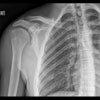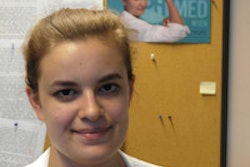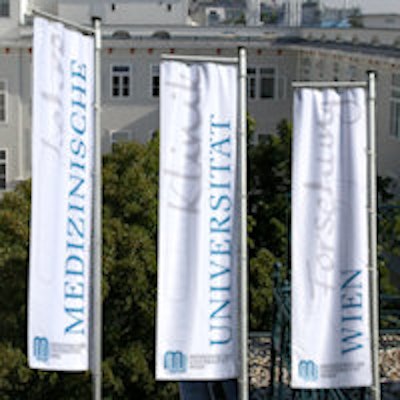
VIENNA - Medical staff at Vienna's general hospital have voted overwhelmingly to support a strike, according to results announced on Thursday, but a walkout is unlikely after doctors clinched a last-minute agreement that includes higher pay and additional support staff.
Dr. Martin Andreas, a surgeon who heads the 20-member doctors council that helped negotiate the settlement, said there would be no walkout as long as the management does not break the agreement. The strike threat forced politicians and the university to agree to nearly all of the doctors' demands, he added.
"There was big support and a lot of colleagues -- 94% -- are ready to strike if the politicians don't ... fulfill what they have promised," Andreas told AuntMinnieEurope.com as the vote count ended.
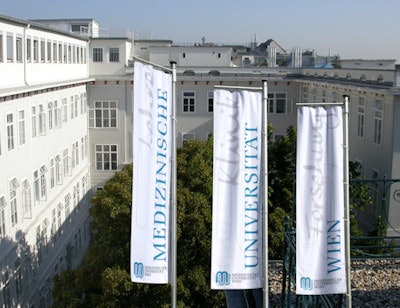 Managers hope the settlement ensures the university continues to be an attractive employer for qualified doctors. Copyright: Medical University of Vienna.
Managers hope the settlement ensures the university continues to be an attractive employer for qualified doctors. Copyright: Medical University of Vienna.The Vienna medical chamber, the Aerztekammer fuer Wien, said 1,018 doctors, or 94.7% of those voting, backed a strike call. Dr. Thomas Szekeres, president of the chamber, said the outcome sends a "clear signal" to hospital managers, adding in a statement that physicians are no longer willing to accept a "deterioration in occupational conditions."
More than 1,900 radiologists and other physicians were eligible to cast ballots from 22-27 May. The vote was done electronically and could not be stopped once polling began, and it was not immediately clear how many physicians voted after the labor agreement was reached.
The deal appears to settle months of tension between the management and doctors at the Allgemeines Krankenhaus (AKH), the clinical arm of the Medical University of Vienna. The bargain was announced Tuesday, the same day that university leaders voted to appoint a successor to the medical school's embattled rector.
More pay and staff assistance
Andreas said doctors got nearly everything they wanted, including:
- A one-off 8,000 euro payment to every doctor this year, a 20% across-the-board increase in pay starting on 1 January 2016, followed by an additional 10% in 2019.
- More input on management decisions.
- The hiring of 85 new staff to assist doctors and nurses with paperwork, administrative duties, and routine medical testing of patients.
Physicians got "two-and-a-half out of three" of their demands, Andreas said. The management offered the lump-sum payment in lieu of the 20% pay increase, retroactive to 1 January 2015 that doctors had sought.
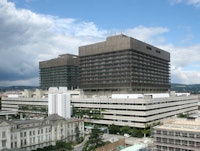 Vienna's general hospital, the AKH, is the clinical arm of the Medical University of Vienna. Copyright: City of Vienna MA 46.
Vienna's general hospital, the AKH, is the clinical arm of the Medical University of Vienna. Copyright: City of Vienna MA 46.Vienna's city government agreed to absorb some of the cost of the deal despite efforts to control spiraling healthcare costs in the Austrian capital.
"This settlement ensures that MedUni Vienna continues to be an attractive employer for qualified doctors," Dr. Wolfgang Schuetz, the rector, said in a statement.
Szekeres, the medical chamber president, welcomed the deal and expressed hope that the organization operating Vienna's 11 other public health facilities, the Krankenanstaltenverbund, would forge a similar bargain with their physicians amid threats of a separate strike by their employees.
AKH is one of Europe's largest medical research institutions and the city's most important facility for emergency and chronic care. The 2,100-bed hospital draws on 27 specialized clinics, including radiology and nuclear medicine, as well as university research centers.
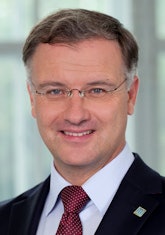 Rector-designate Dr. Markus Mueller. Copyright: Medical University of Vienna, Felicitas Matern.
Rector-designate Dr. Markus Mueller. Copyright: Medical University of Vienna, Felicitas Matern.The labor dispute stems in part from Austria's compliance with the EU's Working Time Directive, which sets a 48-hour maximum workweek even though many doctors traditionally worked well beyond that. Most public medical facilities in Austria agreed to boost base pay for physicians and other medical staff to compensate for lost overtime hours when the law came into force this year.
However, similar benefits were not extended to AKH physicians, who are employees of the state university. The strike vote was called after negotiations between doctors and the Vienna hospital stalled amid broader protests by public hospital health workers over pay and work conditions.
New medical university rector
On Tuesday, the five-member University Council voted to appoint a successor to Schuetz, who has clashed with doctors over the pay issue. Schuetz, rector since 2004, had announced he would not seek another four-year term when his current mandate ends on 30 September.
His successor, Dr. Markus Mueller, is the vice rector for research and principal of the university's Department of Clinical Pharmacology. Last year, he was named chair of the Data Safety Monitoring Board for the World Health Organization's (WHO) Ebola vaccination program.


